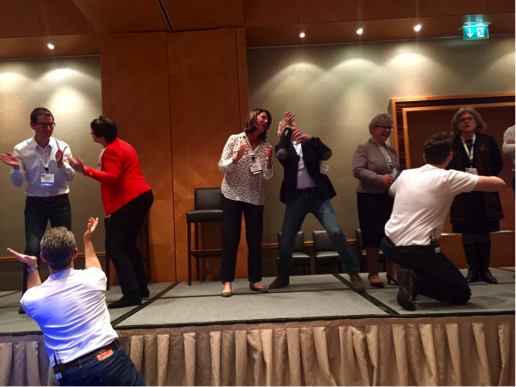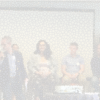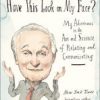My business partner, accomplice, co-creator, and most importantly, friend, Pascal Patenaude, and I had the honor of leading a session on the application of an improvisational mindset at the 2016 QRCA Worldwide Conference in Vienna last month. The theme of the conference was transformation, and the chairs of the conference did a marvelous job assembling a diversity of presenters who shared unique perspectives on research designed to encourage us to think beyond the box into which research is often placed. A special shout-out to Susan Sweet, Kuratoraußergewöhnlich (Curator Extraordinaire), who brilliantly positioned our hyper-energetic take on the value of an improvisational mindset as a countervailing force between the soporific effects of lunch and calming power of Patrick and Patrice Wooldridge’s Tai-Chi-based exploration of the virtue of improvisation.
Playing in Vienna, the heart of some of the world’s greatest musical tradition (and schnitzel), we titled our session was called, “The Unplanned Symphony: Using Improv to Tune into Yourself and Others for the Benefit of Your Work and Your Life.” Our goal was to introduce the tenets of improvisation and how adopting this mindset can help people live and work more fully and satisfactorily.
At the heart of this mindset are a willingness to embrace things most of us find discomfiting: mistakes, risks and vulnerability; and to relinquish things to which many of us cling: judgment, control and intransigence. Integral to the improvisational mindset are wonder, presence, and pursuit of truth. Play, openness and adaptability are its enablers. (We had considered titling our session, “Lighten the F^#% Up and Get Over Yourself,” but we thought that would have been in poor taste.)
- (photos courtesy of Katrina Noelle and Nicki Brunner—thank you!)
- (photos courtesy of Katrina Noelle and Nicki Brunner—thank you!)
- (photos courtesy of Katrina Noelle and Nicki Brunner—thank you!)
We brought these principles to life by having the audience play some basic improv games. Liberating their tushes from the chairs was like unlocking prison doors—they burst out and couldn’t contain themselves. (Kindergarteners are better than some of our colleagues at following directions. One reason we moderators are excluded from participating in research is that we would make terrible participants!) The 35-minute session flew by, giving our colleagues a taste of the fuller improv-related “playshops” we’ve led for clients and fellow researchers.
Why us? How are Pascal and I qualified to talk about improvisation? First of all, we’ve been making stuff up for years. More importantly, we bring to our qualitative research practices experience in other disciplines, as many of our fellow QRCA members do. Pascal uses it in his discussion groups, encouraging participants to role-play situations—to feel and re-live the experience of engaging with a product or brand or dealing with a physical or mental condition. I use improv as part of the ideation technique I developed called, “Out of Focus Groups™.” In addition to being moderators, facilitators and consultants, Pascal and I have performance backgrounds that include improvisational theatre: Pascal studied improv as part of his training at the National Theatre School of Canada and performed it as part of the national touring group; I was in two improv/sketch comedy troupes in Los Angeles with Kristen Wiig, and I often improvise when I perform standup.
We all improvise all the time—when we have a conversation, decide what to do for the day, or deal with anything unexpected. Embracing its worldview—dialing into the freedom it engenders, allowing us to roll with the punches, and appreciating the world around us—truly can help us make our through the world in a more meaningful, satisfying and fun way.



 Back to the blog
Back to the blog Subscribe
Subscribe



 Twitter
Twitter